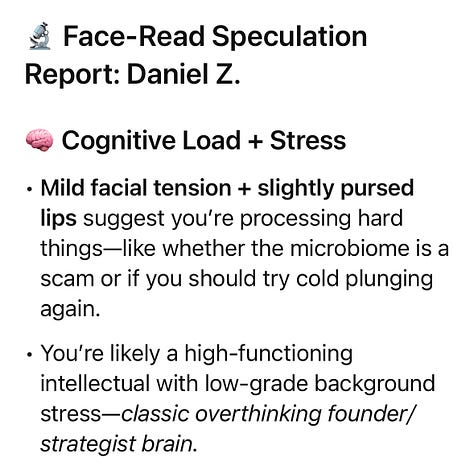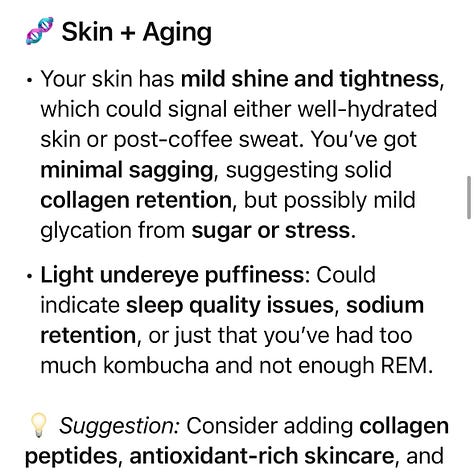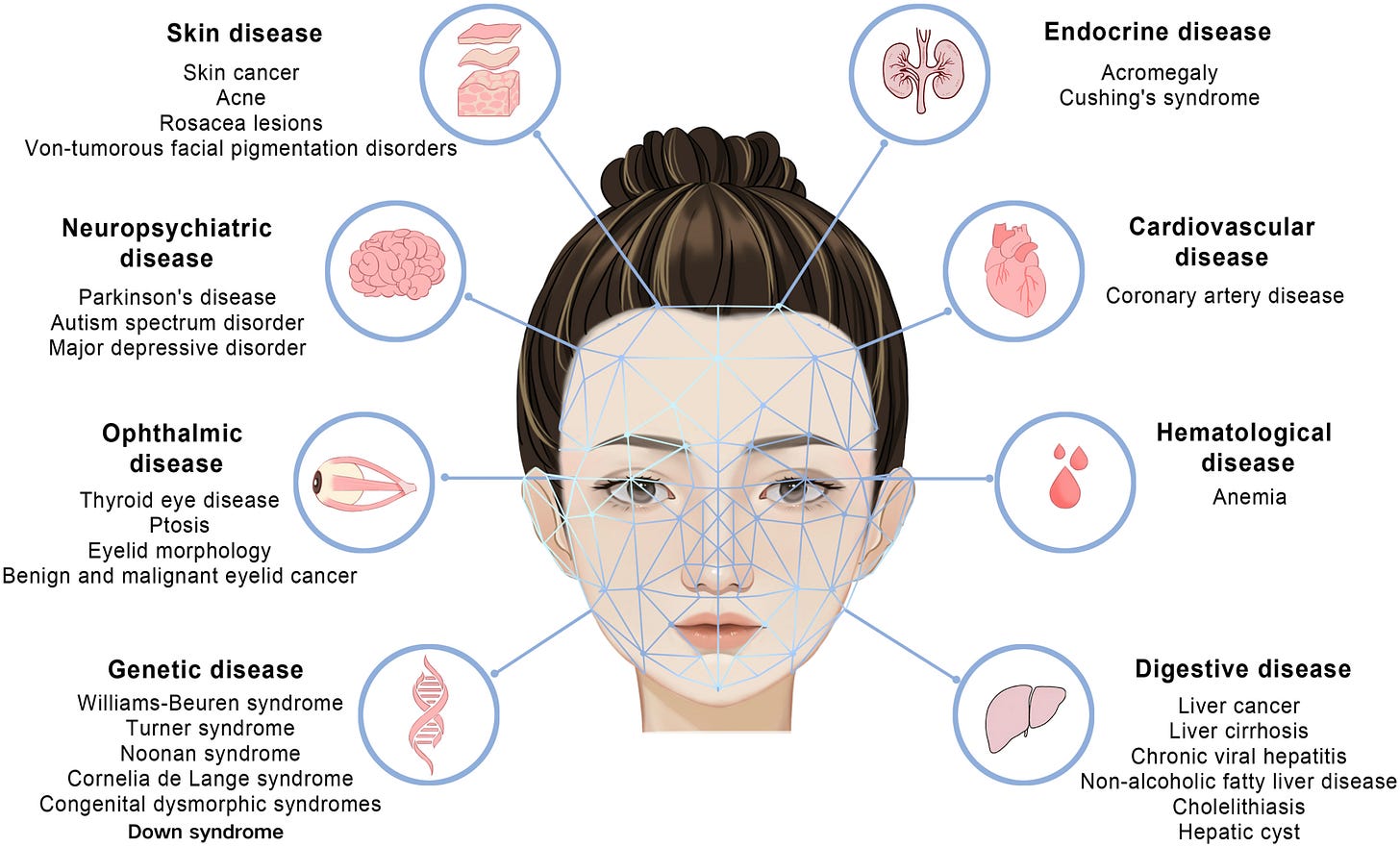Vitamin Z is a newsletter about health and wellness with 3,000 subscribers.
“As someone who works in health and wellness, I appreciate how you cover so many interesting and important topics. Thanks for sharing your writing!” – Eric, paid reader
I did something unusual a few days ago.
I took a selfie, uploaded it to ChatGPT and gave it this prompt:
“What can you tell me about my health that I might not know? This is a photo of me. Feel free to speculate on the state of my gut, organs, fitness, aging/skin, and more. I'm just doing this for fun, but would like your best, scientifically-driven attempt.”
I took a deep breath as I clicked send, bracing myself for judgment from the AI. (As a veteran of the dating app world, I’m no stranger to photo-based feedback.)
ChatGPT replied with a disclaimer:
“While I can't diagnose or make definitive health claims from a photo, I can offer science-informed guesses based on visual cues.”
Then, it analyzed my health across several dimensions:



Some of the AI’s feedback felt surprisingly accurate (I’ve been meaning to find a good eye cream), while other parts were clearly speculative.
Still, I was struck by the potential.
What if facial analysis could actually deliver real-time health insights and personalized recommendations—just from a selfie?
Welcome to the new world of AI-powered facial analysis.
New research shows that your face doesn’t just reveal how tired you look or how well you’re aging — it contains subtle, quantifiable signals related to your biological age, disease risk, and even life expectancy.
In this piece, I’ll explore the science of facial biomarkers, the emerging healthcare applications, and how you can start using this technology today.
The Science of Facial Biomarkers
One of the biggest breakthroughs in facial AI came earlier this year.
Researchers at Mass General Brigham developed a deep learning model called FaceAge, trained on over 59,000 healthy individuals, that can predict biological age from facial photographs.
The study, recently published in The Lancet Digital Health, shows how facial features captured in an image reveal biological signals that correlate with a person’s aging process and can predict clinical outcomes in oncological care.
FaceAge was shown to predict survival outcomes in cancer patients more accurately than chronological age. On average, cancer patients looked five years older than their actual age—and that facial age was a better predictor of outcomes than doctors’ estimates.
This opens the door to much more: Facial features may offer a noninvasive, low-cost way to assess biological aging, detect disease early, and monitor health over time.

Researchers have also found links between facial characteristics and broader systemic health:
Skin texture / elasticity → oxidative stress + sun damage
Under-eye puffiness → inflammation, sleep issues
Wrinkles / symmetry → age and vitality markers
In short: your skin and facial structure may offer real-time feedback on what's happening inside your body.
When your liver is taxed by alcohol and sugar, your skin often shows it. Chronic stress can lead to acne, inflammation, or premature aging. Your face may be the mirror of your internal systems.
Facial Scans Could Transform Healthcare
For centuries, doctors and nurses have made judgments about patients’ overall condition based on how they look. Now, AI can make those assessments quantitative, repeatable, and objective.
Imagine:
Oncologists using facial scans to assess whether a patient is healthy enough for chemotherapy
Primary care doctors combining facial biomarkers with bloodwork to catch early signs of metabolic disease
Remote triage tools analyzing a selfie to flag at-risk patients in low-resource settings
This isn’t science fiction—tools already exist to screen for visual impairments, genetic disorders, and signs of stroke using facial cues.
Of course, challenges remain. Bias in training data, data privacy, and misuse by insurers or employers are all real concerns. Regulatory oversight and representative training datasets will be key to keeping this technology equitable and safe.
How to Try it Today
Several apps already allow you to experiment with facial health scanning from your phone:
Panoptic AI’s Vitals app – Collect key health indicators using the camera of your smartphone, tablet, or computer.
ChatGPT – Upload a selfie and ask: “Do I look inflamed? Tired? Stressed?”
L’Oréal Paris Skin Genius – Analyze your skin's specific needs and create a personalized skincare routine.
These tools are still early-stage, but the direction is clear: paired with wearables and lab data, facial AI could form part of a full-body digital health dashboard.
What's Next: The Face as a Health Coach
Soon, facial scanning could help power a new wave of personalized AI health recommendations.
You’ll upload a selfie and ask:
“How can I shave five years off my biological age?”
“What changes would reduce my facial inflammation?”
And the AI will respond with tailored recommendations: improve sleep, reduce sugar, try cold plunges, switch to this moisturizer. Eventually, this tech could:
Project how your face will age under different lifestyle paths
Detect mood and mental health shifts from micro-expressions
Sync with nutrition and fitness apps for dynamic habit coaching
We’re entering an era where your front-facing camera becomes a health tool. Like your gut microbiome or your genome, your face is now a biometric dataset—and one of the most accessible ones.
Used wisely, AI-powered facial analysis could help millions detect disease early, optimize their health, and extend their healthspan.
Your face tells a story. Now we finally have the tools to read it.
Thank you for reading this week’s edition of Vitamin Z.
Until next time,
Note to readers: I just launched my new professional website and am currently taking on new consulting clients while I search for my next full-time professional role. If you have suggestions of people I should talk to, please shoot me an email. Thanks!
By Daniel Zahler
Hi there and thanks for reading. I created Vitamin Z to share my research on health and wellness, longevity and healthy aging, and ways to optimize cognitive, physical and emotional health. I have interviewed hundreds of doctors and health system leaders to help my clients spot trends and opportunities in healthcare. I am an advisor to Noom, a digital health company helping millions live better longer, and a project leader at GLG, where I advise global business leaders on healthcare innovation.
Enjoyed your reading experience?
Follow me on LinkedIn and X / Twitter
Hit reply with your feedback and ideas :)
Share this post with others.






